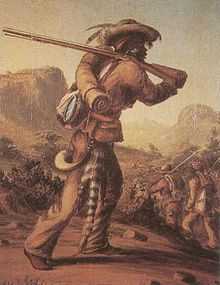Sarili kaHintsa

Sarili ka Hintsa (about 1810 - 1892) was the 5th chief of the Gcaleka sub-group of the Xhosa nation, and paramount chief of all the Xhosa, from 1835 until his death in 1892 at Sholora, Bomvanaland. He was also known as "Kreli", and led the Gcaleka armies in a series of frontier wars.[1]
Early life and family
Sarili was the oldest son of the great Hintsa ka Khawuta and Nomsa kaGambushe Tshezi.
Sarili had nine wives including Nohuthe, Nondwe of the abaThembu and Bayo of the amaGwali. His first heir died in 1853 at the age of 12 and the next in line was his son Sigcawu ka Sarili from his second wife Nohuthe. His daughter Novili Nomkafulo became the great wife of Ngangelizwe Qeya, the 6th paramount chief of the abaThembu. Another daughter became the wife of Mhlontlo of the Mpondomise and another became the wife of Chief Gwadiso of the Knonjwao.
Reign (1835-1892)
Throughout his reign, Sarili struggled against the expanding British Empire. He was a skilled diplomat who was respected and loved, even by those of the prominent whites of the Cape who knew him well.
He typically sought to maintain Gcaleka independence by avoiding direct confrontation with the British. This strategy initially worked, but as a nationalist and paramount chief of all the Xhosa, he was later drawn into conflict with the British by the neighbouring Ngqika Xhosa. His Kingdom's indirect aid to the Ngqika during the Seventh and Eighth Frontier Wars (1846–1853) was discovered and led to a temporary white invasion of Gcalekaland.[2]
The Great Cattle Killing (1856-1858) and aftermath
Sarili played an important part in the Great Cattle Killing, a millennialist movement which began among the Xhosa in 1856, and led them to destroy their own means of subsistence in the belief that it would bring about salvation by supernatural spirits, who would return and drive the white people into the sea. Genuinely believing the prophecies of Nongqawuse, Sarili destroyed his cattle and crops, causing thousands of his subjects to do likewise. The famine that followed devastated the last Xhosa Kingdom, forcing the Xhosa to turn to the neighbouring Cape Colony for food, blankets and other relief. His fostering of the cattle killing also led to him being hated in white opinion, as the supposed villain of the frontier conflicts. He was briefly exiled from Gcalekaland, to the territory on the far side of the Mbashe, only being allowed to return in 1865. In his absence, the Mfengu people (traditional enemies of the Gcaleka) settled in much of his former land.[3]
The Fengu-Gcaleka War (1877-1879)


Subsequently, the policies of the Cape Colony and those of the British Empire differed, with regards to Sarili. The Cape achieved responsible government in 1872 and, with little further interest in annexing Xhosa land, signed treaties with both Sarili and his enemies such as the Thembu, recognising Gcalekaland's territorial integrity. The British on the other hand, sought to offer "protection" to increasing numbers of Transkeian chiefdoms, isolating Sarili diplomatically and constricting his power in the region. Both parties appear to have deliberately favoured Sarili's enemies in trade and other dealings with the Transkei territories, and when fighting broke out between Sarili and the neighbouring Thembu, the British intervened once again and brought yet another of his opponents under British "protection".
From the mid-1870s, a series of severe droughts across the Transkei began to place growing strain on the relative peace which had prevailed for the previous few decades. The droughts had begun as early as 1875 in Sarhili's territory, and had spread to other parts of the Transkei and Basutoland, and even into the Cape Colony controlled Ciskei. Their severity increased up until 1877 and ethnic tensions began to break out, particularly between the Mfengu, the Thembu and the Gcaleka Xhosa.[4][5][6]
In 1877, fighting between Mfengu and Gcaleka tribesmen broke out at a festival, rapidly escalating into a shoot-out and finally into a full-blown inter-tribal war that spread along the frontier. Sarili sought to avoid any further escalation of this conflict, as he fully understood that the Mfengu, as allies of the Cape Colony, would draw in both the Cape and the British Imperial forces. However he was nonetheless forced into involvement by several of his councillors and chiefs. Decades of provocation from his enemies, overpopulation, and pressure from his councillors drove Sarili into a corner, and he mobilised his armies. Initially the situation seemed unlikely to escalate further, as the Cape Colony government insisted on only deploying its local mounted commandos to police the frontier, but the involvement of the British Empire, via Sir Bartle Frere, desiring to finally annex Gcalekaland for his planned British Confederation, sealed the fate of the last independent Xhosa kingdom.
Sarili tried to unite the Xhosa tribes into a unified force for resistance, but after two devastating pitched battles, he declared an end to the struggle and went into exile, first in Pondoland and afterwards to Bomvanaland.
He died in exile in 1892, at Sholora, Bomvanaland. [7]
References
- ↑ http://www.worldstatesmen.org/South_Africa_Bantu.html
- ↑ R. Kent Rasmussen:Dictionary of African historical biography. University of California Press, 1989. p.686. ISBN 0-520-06611-1
- ↑ R. Kent Rasmussen:Dictionary of African historical biography. University of California Press, 1989. p.688. ISBN 0-520-06611-1
- ↑ J. Fage, R. Oliver: The Cambridge History of Africa, Volume 6 (1870-1905). Cambridge University Press, 1985. p.387.
- ↑ http://eprints.ru.ac.za/1761/1/Spicer-MA-TR78-38.pdf
- ↑ C. Bundy: The Rise and Fall of South African Peasantry. University of California Press, 1979. p.83.
- ↑ Beck, Roger B. (2000). The history of South Africa. Westport, Connecticut: Greenwood Publishing Group. p. 40. ISBN 978-0-313-30730-0.